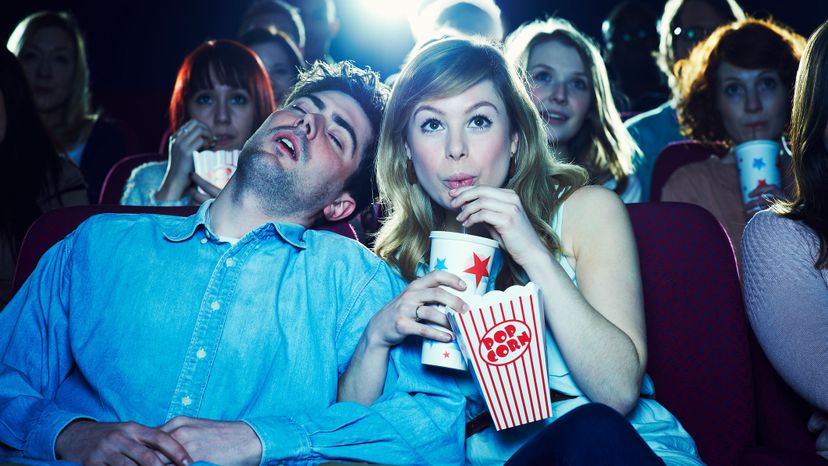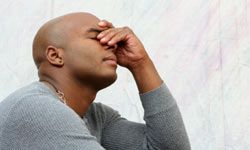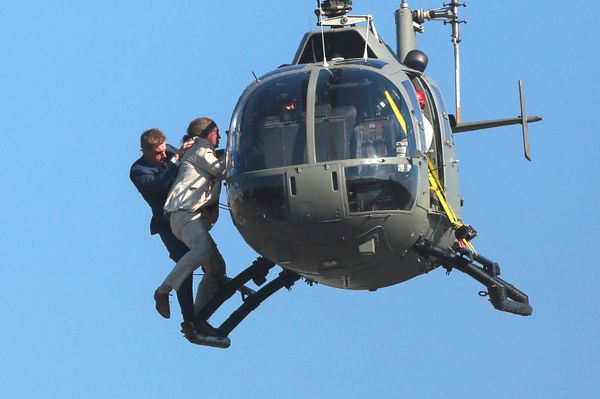
No one shells out $15 per movie ticket to take a nap, yet many people can't helping falling asleep in movie theaters, even during loud, blow-em-up action films. What gives? Sure, movie theaters are dark and those plush, reclining seats are darn comfortable, but is that enough to cause a healthy adult to pass out in the middle of the afternoon?
We reached out to Murray Johns, an Australian sleep doctor who invented the Epworth Sleepiness Scale (ESS), the global standard for measuring an individual's propensity dozing off during eight different daily activities. Patients are asked to rate from 0 to 3 their likelihood of falling asleep during the day while reading, watching TV, riding in the car, etc. For seven of the eight activities, you'd expect to stay awake (the exception being "lying down to rest in the afternoon when circumstances permit," i.e. siesta time), yet many of us still doze off.
Advertisement
In 2002, Johns collected sleepiness data from more than 2,800 adults in seven countries and used it to rank each activity on the ESS by its relative sleep-inducing power, or what he calls its "somnificity." According to the study, topping the list of most "somniferous" activities is lying down to rest in the afternoon (of course), followed by "watching TV," then "sitting and reading." Movie theaters don't show up until No. 6, "sitting, inactive in a public place (e.g. a theatre or meeting)," which has a somnificity score less than half of watching TV, but twice as sleep-inducing as sitting and talking with someone.
Why are some daytime activities more somniferous than others? Posture plays a big role, Johns concluded.
"A situation with high somnificity is one where you're not moving much. You might be sitting, but you won't be standing, and you won't be moving your head and neck in particular," says Johns. When the muscles in the head and neck relax, he explains, that sends signals to the brain to reduce something called the "secondary wake drive." And when that drive is reduced, sleep is more likely to take over.
That's because sleepiness and wakefulness are products of two separate bundles of nerve cells in your brain that regulate the "sleep drive" and the "wake drive." Your sleep drive and wake drive exist in a yin-and-yang relationship, meaning they are mutually inhibitory. The wake drive inhibits the sleep drive and the sleep drive inhibits the wake drive. Whichever is dominant at any given moment determines whether you are awake or out cold.
Most of the push and pull between the sleep and wake drives is hardwired by the circadian alerting system (or internal biological clock), which is programmed to keep us alert for roughly 16 hours a day and sleepy for eight hours. That's why jet lag is so disorienting, because our internal awake/sleep clock hasn't updated to the new time zone.
But the biological clock only controls what Johns called the "primary wake drive." There's also a secondary wake drive, he believes, that's influenced by physical postures and activity levels.
"When you stand up, the muscles and joints that are involved in maintaining your posture produce some contribution to the secondary wake drive," Johns says. "When you sit down, or perhaps more relevantly, when you lie down and close your eyes and stop moving, you reduce this secondary wake drive and that induces sleep."
That partially explains why reading, or watching TV or a movie, can push us over the edge into Sleepytown. We're sitting still, head and neck relaxed. But why is TV-watching twice as likely to put people asleep? Probably because a lot of adults watch TV to wind down at the end of a long day, precisely as the wake drive is giving way to the sleep signals. (Many also watch TV lying down.) Going to the movies, on the other hand, is more of an "exciting" activity than a relaxing one.
But why is it that some people fall asleep during absolutely any movie, even films with blaring soundtracks and endless explosions? In that case, it might be a sign of an underlying sleep disorder.
Philip Gehrman is a sleep scientist and assistant professor of psychiatry at the University of Pennsylvania Perelman School of Medicine. In his practice, he deploys the Epworth Sleepiness Scale as a tool for diagnosing sleep disorders "based on the idea that if you're well rested, you should be able to maintain wakefulness even in sedentary, quiet activities," Gehrman says.
Gehrman says that falling asleep in the movies, even sometimes, is a sign of a sleep deficit. That deficit could be caused by simply being overtired or because of a sleep disorder.
It's true that most of us simply aren't sleeping enough -- the National Sleep Foundation recommends seven to nine hours for adults 26-64 -- but others may suffer from more serious sleep disorders like sleep apnea that can profoundly disrupt sleep. One reason why older people are more likely to doze off in movie theaters is that you're more likely to have a sleep disorder as you age, says Gehrman. So, if you're one of those people who always starts to snore 10 minutes into the latest action flick, you might want to tell your doctor.
Advertisement

